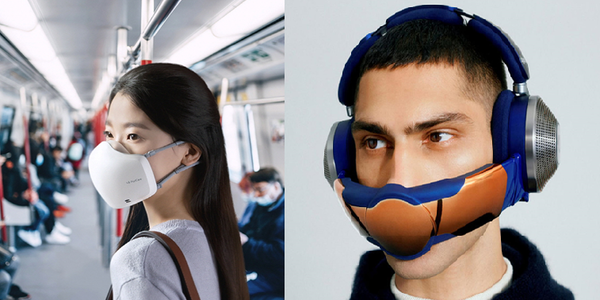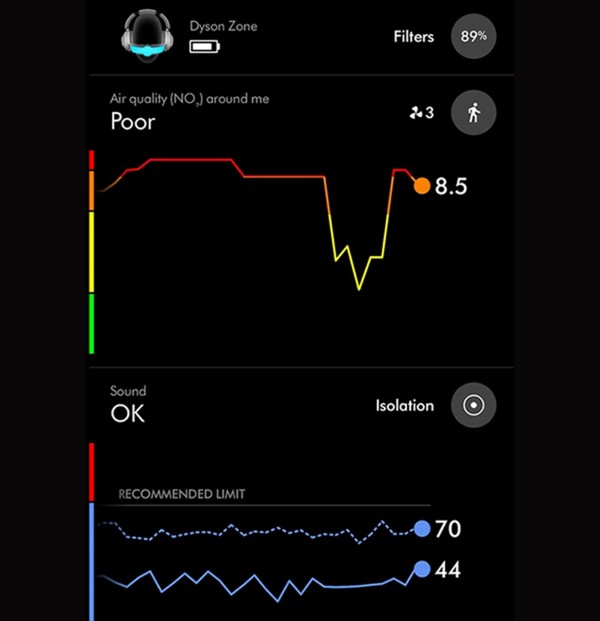Competition in the reusable and electronic mask market is heating up as two companies, LG Electronics and Dyson unveiled their reusable air purifying masks in a respective public announcement on Thursday.

LG’s electronic air purifying mask called, LG PuriCare Mask, was first launched in Hong Kong last year, followed by 23 other countries including Taiwan, Vietnam, and Spain.
However, Korea is next in line for the launch of the electronic mask, citing no safety standards related to electronic masks in Korea as the reason for the delay.
Accordingly, the Korean Agency for Technology and Standards established the "Preliminary Safety Standard for Electronic Masks” under which LG’s 123g mask was the first to be certified.
It is also the first in Korea to obtain electrical mask (EM) certification from the Korea Air Cleaning Association after evaluation of its leakage rate, intake resistance, and filter performance.
The PuriCare mask features an ergonomic design tailored to the face structure to minimize air leakage and medical-grade silicon materials to minimize skin irritation. It is also equipped with disposable filters to keep out 99.99 percent of the 0.01 micrometer-sized particles and bacteria and a small fan that helps circulate air, according to the company.
Additionally, it comes with a breathing sensor that detects inhalation and exhalation and helps control the amount of air flowing through the mask by adjusting the speed of the fans according to the amount of breathing during exercise. You can change this filter once a month.
Compared to single-use masks, their reusability, enhanced breathing comfort, and glasses fog prevention were noted as the main selling points.
Meanwhile, Dyson has taken it up a notch with its Dyson Zone which functions simultaneously as an air-purifying mask and noise-canceling headphones. As a result, the design is radically different resembling the mask Bane wore in the movie “Batman” with the option to remove the mask and just use the headphones.
Dyson uses a compressor, built into each ear cup to filter and delivers purified air through the dual layer to the user's nose and mouth in two flows through the removable contactless visor. The electrostatic filter removes fine dust as small as 0.1 microns2 while the K-carbon potassium concentrated carbon filter captures the most harmful gases for urban pollution, including nitrogen dioxide (NO2) and sulfur dioxide (SO2).
Its filters last for up to 12 months depending on the region, said a company official.
The Dyson Zone is designed to target the dual challenges of city noise and air pollution and is powered by an advanced lithium-ion battery with USB-C charging capability. The device offers a run time of 50 hours when using the audio function alone, or four hours when using the purification and audio functions together.

The MyDyson app allows users to adjust the airflow speed and noise canceling mode. Moreover, the built-in sensors not only tell you the noise level in your environment in real-time but also monitor the air, including tracking nitrogen dioxide (NO2) levels in real time via the app.
The Dyson Zone informs you about a healthier lifestyle by providing instant, actionable and understandable information about your environment while adjusting the purified airflow automatically when the visor is attached.
Other features of the LG mask include its IPX 4th-grade waterproof function and a built-in microphone and speaker, allowing users to have a smooth conversation. The mask can also be used for up to eight hours when fully charged and alerts users to change the filter via the LG ThinQ app.
Its sterilized charging case, which is sold separately, has a UV nano function and sends out six UV (UV) LEDs toward the surface of the mask and the face guard which sterilizes the bacteria.
Consequently, LG’s mask is being sold at 199,000 won (approximately $153) for masks and 149,000 won for the case. In comparison, Dyson Korea has not yet released the launching schedule in Korea but its retail price in the U.S. is set at $949 which will be available in March next year. This hefty price comes as the mask boasts the best in audio engineering with advanced noise-canceling technology and high-fidelity, full-spectrum audio.
However, with mask mandates scheduled to drop in January in Korea, it is unsure how exactly this might impact sales. In this regard, both masks are being marketed toward air purification rather than protection against virus particles as fine dust is often an issue in Korea.

